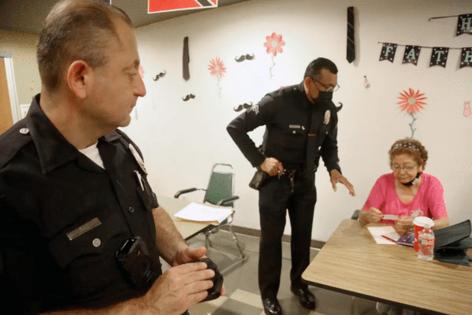It's the season for scams, so here's a piece of advice: Never do business with strangers
Published in Senior Living Features
LOS ANGELES -- The text arrived midday, saying a delivery to me was on hold. To fix the problem, all I had to do was click on a web link and enter my ZIP Code.
"Have a great day from the USPS team!" the text said.
The awkwardly worded message (with bad punctuation and an international phone number) was clearly not from the Postal Service. And if I can hazard a wild guess, I don't think the senders really wanted me to have a great day.
They wanted to rip me off and, so, a word to the wise this holiday season:
Watch your wallet.
Fraud is a year-round, multibillion-dollar international enterprise. But for thieves, the season of joy is a wide-open window of opportunity, as AARP warned Nov. 18:
"With scammers looking to take advantage of consumers from all angles, new AARP survey research reveals that people need to be vigilant this holiday season as they buy gifts, book their travel arrangements, and donate to charities."
Many of the scams are run by sophisticated international syndicates, said Kathy Stokes, director of fraud prevention at AARP's Fraud Watch Network. Those crooks are working every channel, fishing for victims by email, phone calls, texts, fliers and regular mail.
Unwitting people are forking over money via gift cards, cryptocurrency, credit cards, cash and wire transfers. Losses often are virtually impossible to recover because the money is on foreign soil before the victims know they've been robbed.
Stokes said that in one common ripoff, thieves are going after people who own timeshares they're trying to dump.
"There's all this paperwork that makes it look legitimate, like you're paying to get out of the timeshare," Stokes said. But the crooks are pocketing thousands of dollars while the target is still stuck with the timeshare.
Last week, in a national conference on scams targeting older adults, Deborah Royster of the federal Consumer Financial Protection Bureau warned that consumers are being wiped out in a flash.
"Retirement savings and other resources that people have earned over a lifetime, and depend on," Royster said, "can be gone in an instant."
In that same conference, Virginia lawyer Julie M. Strandlie said her 85-year-old mother lost $80,000 between Thanksgiving and Christmas five years ago in a common scam that began with "flashing graphics and pounding voices" on her computer screen, warning of a virus.
"There's a number to call for help, but it's not the real Microsoft," Strandlie said.
Her mother fell for the ruse, giving the criminals remote access to unlock her frozen computer. She was then duped into believing they had deposited money into her account, and she needed to pay it back in cash and gift cards from Best Buy and Target.
Steve McFarland, president and CEO of the Better Business Bureau region that runs from Palo Alto to Long Beach, said his office is getting 1,100 consumer complaints of all types each and every day.
He wasn't kidding and repeated the number.
McFarland and other sources say a greater percentage of millennials report fraud than do older adults, but the latter group suffers greater losses. And across the age spectrum, McFarland said, gift card scams are hot right now.
Bar codes on those cards can be tampered with or photographed by someone before they're sold, McFarland said. The buyer of the card goes to a checkout stand and puts, let's say, $100 on the card to be redeemed at Target, Burger King or any number of establishments.
But when the recipient goes to redeem it, the funds are gone. It happened last year to L.A. County Supervisor Janice Hahn, who bought a $100 VISA gift card for a nephew who found that it wasn't worth a nickel. Hahn later warned of the scam, along with McFarland, on L.A.'s Eyewitness News.
"It's called gift card draining and these scammers have found several slick ways to victimize unsuspecting shoppers," Hahn said.
In addition to outright scams, this is a time of year when solicitations for charitable donations can fill your mailbox.
"A lot of charities are trying to close out strong, and criminals know that and are vying for the same dollars," Stokes said.
If it's not an established organization that's known for its good work, Stokes advised going to the Better Business Bureau's give.org website, where you can type in the name of the charity to find out whether it's legit. You can also find out what percentage of donations go to the cause versus overhead costs.
Your best policy, unfortunately, is to be suspicious of everything. I recently got a letter with my mortgage lender's name in the window and opened it to find a warning that this was my "FINAL NOTICE" to avoid a monthly payment increase.
It looked hinky, and on the back page, in fine print, I learned that the mail was from a lender unaffiliated with my mortgage company.
If you see "final notice," "urgent" or "benefit disbursement enclosed," don't even bother opening the envelope.
A friend shared a tall stack of mail that keeps coming for his mother, who died months ago, and as I sifted through it I found one attempt after another to separate her from her money. "Copy of Final Check Enclosed," said one, and in the cellophane window was what looked like a check for $437.18 that said "Pay to the order of …"
But it wasn't a check, of course. It was a solicitation from a lobbying firm claiming it will fight to preserve Social Security funding (and by the way, she had a lot of mail from organizations claiming they were out to do the same).
The fake check was described as an example of what she stood to lose if she didn't immediately support the cause by pulling out her credit card and making an "urgent donation" to keep Social Security solvent.
And then there were solicitations from organizations representing a Noah's Ark of endangered animals. Look, I'm an animal lover, but how does one begin to sort through all the pleas?
Save the pigs. The horses. The bees. The lions. The donkeys.
"Sunday, a baby donkey was ripped from his mother and brutalized," said one envelope.
Lots of appeals for dogs, too. One included the photo of a dog with amazing verbal skills, judging by the quote attributed to the canine: "I wish for no one else to be hurt the way humans have hurt me."
I feel for the dog, but if he can actually speak, let's get him an agent and send him out on tour so the pup can raise a fortune for his cause.
Of course, there are plenty of good charities out there that are worthy of your generosity, but be careful.
With solicitations. With email. With texts. With phone calls.
All of it.
Banks should be doing more to prevent repeated, questionable, out-of-the-ordinary withdrawals and wire transfers. The gift card industry ought to be able to rein in rampant fraud with smarter security measures.
And people of all ages need to be more discerning, refuse to provide personal information such as Social Security numbers, and get some advice from a trusted friend or loved one before signing any checks or doing business with strangers.
Last year I wrote about two retired L.A. residents, a former teacher and a former banker, who were swindled out of roughly $80,000 apiece in internet scams. Earlier this year I wrote about a Redwood City woman who was taken for $1.8 million, and an Alhambra woman, Alice Lin, who lost $720,000 in an "investment" scheme introduced to her by a man she met on a chat app.
I reached out to Lin, who had some good advice on all forms of communication from sources you don't know or trust.
"Do not respond," Lin said. "Don't touch it."
©2024 Los Angeles Times. Visit at latimes.com. Distributed by Tribune Content Agency, LLC.












Comments